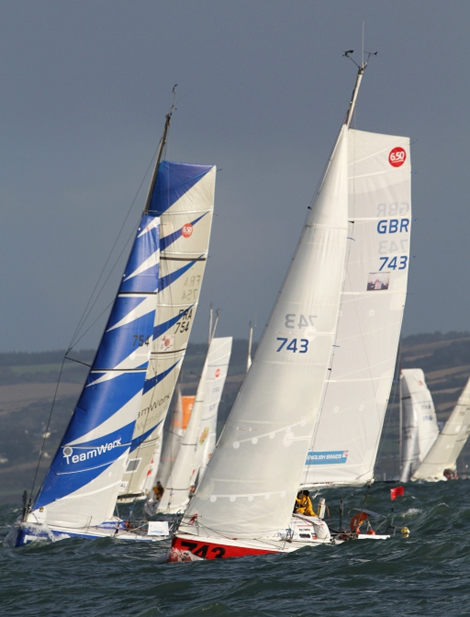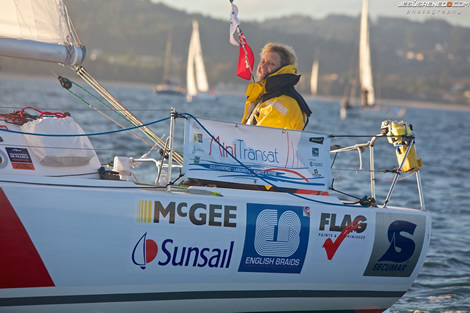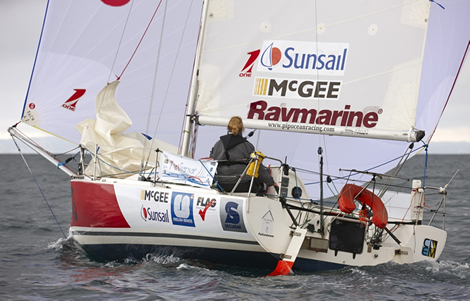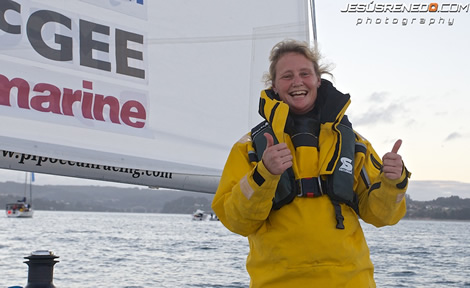
Pip Hare, the comeback kid
Pip Hare, Britain’s sole competitor in this year’s Mini Transat, reached the finish in Pointe a Pitre, Guadeloupe at 14:17:05 UTC on Monday, completing the 3700 mile course from Sada in northwest Spain in a time 26 days 05 hours 32 minutes and 5 seconds. Racing her Pogo 2 The Potting Shed in the Series class, Pip arrived 16th of 35 potential finishers and 53 starters, one place better than her result in the race two years ago.
Aside from Benoit Marie’s come-from-behind win in the Protos class and the runaway victory of Aymeric Belloir in the Series fleet, the 2013 Mini Transat will be remembered for being the most delayed event in the history of yacht racing. It was scheduled to start on 13 October from Douarnanez. However the competitors patently waited for 16 days before a weather window opened allowing them to get away from the Breton start port. However as they were crossing the Bay of Biscay, the race organisers requested the fleet to stop in Spain because of the deteriorating forecast at Cape Finisterre.
The lead five boats made it to Sada, close to La Coruna in northwest Spain while the rest of the giant fleet piled into Gijon further along the north coast of Spain, to the east. There was then a further wait, as the race organisers announced that the first leg from Douarnanez would not count, and it was not until 13 November, one month after it was supposed to leave Douarnanez, that the race properly got under way from Sada...ironically into gale force winds and giant seas.
“I wasn’t suicidal - I’d come out of the other side!” recalls Pip of her mindset during the prolonged delay. “But you wonder why they kept us ashore for a month.” Moods were made no better in the fleet when there was a final day’s delay as some of the skippers hadn’t delivered their boats to Sada from Gijon in time. Very ‘un-Mini-like’ behaviour.
The unscheduled stopover in Spain brought its own difficulties. With Minis being just 21ft long and their skippers profoundly weight conscious, they don’t carry any gear on board for life on land. “We turned up without sleeping bags, mattresses, no clothes, no shoes, no soap and we had to stay for a week... You have to resist the temptation to go out and buy a new wardrobe.”
Everyone had wallets and passports, but not phones or computers, although these were eventually returned when the lorry that had been heading for the first stopover port in Puerto Calero was diverted just before it was about to board the ferry to Lanzarote. However a lot of gear had been sent to the Canary Islands stopover independently and a lot of friends and family, including Pip’s mum, had booked abortive trips to the islands to see the skippers in.
Fortunately in Gijon and Sada the locals rallied to help competitors. Described as being like Cowes out of season, Sada stepped up, no doubt thankful for this unexpected autumnal windfall, providing the use of its cultural centre for race briefings and holding a reception for the competitors in their town hall.
For Pip, the delay initially brought stress as she is taking unpaid leave from her job with the RNLI. Fortunately her employer gave her the green light and said it was okay for her to return to work in January.
The reasons for the lengthy delays were of course due to the relentless bad weather or at least the prospect of it, but the Mini Transat’s organisers copped much criticism for being too pampering of their fleet. The Mini Transat is the pinnacle of the class’ calendar, there are substantial hurdles competitors must leap to qualify for it and the sailors should be prepared to face nasty conditions.
According to Pip, the exact reasons for the endless delays remain a mystery. “I thought maybe they were being leaned on by the French authority, but I asked the Class President and he said that wasn’t the case. It doesn’t make sense to me. Maybe they have become too risk-adverse.
"I think everyone missed the point that we don’t have to stay out there. We are allowed 72 hours of 'technical stopover' and we can put into port if we don’t feel the conditions are right for us. If they start the race and it is 40 knots, we can cross the start line and come back in again. If we get the option of taking that risk taken away from us, then very soon racing is not going to happen any more because organisers will become too scared to send a race off.”
When the race did finally get away, one month late, all was going well for Pip until the second night at sea when she suffered a major wipe out. “The pilot was driving and I took a wave from a completely different angle with the Code 5 up. It was still over 30 knots and the boat Chinese gybed and ended up flat in the water, Code 5 in the water, backstay on the wrong side, etc. It took me such a long time to sort it out and the mast was flogging and panting every time the Code 5 filled and this caused the collar to break that the lower spreaders sit in.”
She then had to sail gingerly back upwind towards Cascais where she managed to get a new spreader collar machined up before she was able to set off again. “That probably cost me 36 hours I reckon. Naturally I am gutting, but that’s yacht racing for you. and had just sailed really conservatively, I could have done a lot better.
“It is funny – when I broke my spreaders, I didn’t react to it particularly. I wasn’t particularly upset then. I just went in and sorted it out and it was all done really quickly. Even then I think I didn’t lament about it until I started to make up the places and then I started to get a bit upset. I don’t know if it was my fault or not. I possibly shouldn’t have tried to push the boat so hard after Finsiterre and maybe have sailed a bit more conservative and not bothered putting up the Code 5 up. But in hindsight, I don’t know if I would have done anything differently.”

When she restarted in the early hours of 16 November, she was lying in 36th place in the Series class, already 326 miles behind the leader.
If the heinous weather had caused the lengthy delays to the start, the weather during also misbehaved this Mini Transat with a shallow depression creeping south to 30°N, halting the Trade Winds and putting some boats on the wind and becalming others. This affected all but the front runners.
While she was still only in 34th place when she passed through the Puerto Calero gate (the stopover there was cancelled due to the delays starting), her southerly route, attempting to avoid the Canaries wind shadow, paid handsomely and two days later she was up to 21st.
But the move that allowed Pip to get back into this race came around a week after passing the gate off Puerto Calero when she gybed to get north of this depression. However she admits that she was quite lucky to have got the information that enabled her to make this move, as Mini sailors are allowed no comms other than VHF and an HF/SSB receiver, through which they can receive forecasts.
“It is so difficult to work out what the hell is going on. They give you the weather in French and English, but it is done over the telephone, so when the French forecast comes on, Radio Monaco adjusts everything so that we can hear Denis [the Race Director] really well giving the French forecast and then they swap to a different phone for an English one, and that is so hard to work out what they are saying because of the interference. They give you the Area Forecast, but that is worth nothing and with the General Situation, they are describing a synoptic chart to you and it is really really hard to work out what is going on. At the same time as well, you can’t use the autopilot while you are trying to get the weather, so you are steering with an SSB radio on your lap, trying to tune it in and write the forecast at the same time as helming...”
Fortunately from what Pip picked out of the General Situation and on hearing that there were going to be westerlies south of 22°N she chose to go north. “I had 18 hours of 35-40 knots, driving rain, just really vicious, but it was all downwind. Then that blew through and I had some trades and then straight into the back of another depression. It has not been the race any of us were expecting.”
By the morning of 29 November she was one of the most northerly in the fleet and had moved up to 14th place and then up to 13th on 2 December, a position she was to remain in for the next two days.
Unfortunately at around this time her SSB radio packed up and she was unable to receive even the sketchy forecast and 5 December she was becalmed for 18 hours. “I looked at it over and over again and I just couldn’t understand why there was no wind, because the cumulus was making its way across the top of me. There was wind up there, but there was no wind at sea level at all. That was the worst thing.
"Plus you are on your own and you are so isolated, you haven’t got access to the internet and you didn’t know where everyone else was. I believed I was on my own, because I took a more northerly route and I hadn’t had any radio contact with anyone at all. So every hour I was counting down the miles I was losing. It was absolute torture. At that point, I was 13th and I was thinking of going for it, to try and get into the top 10, but after I was becalmed I knew it was game over.”
Those following the race will have noticed that the finish for Pip was particularly close with Robert Rosen Jacobson on Postillion Hotels arriving just over 30 minutes ahead of her. However with no comms, Minis being so small and approaching the finish from a different angle, Pip was oblivious to this. “I had a complete information black-out - I couldn’t get anything on the SSB and because I was so far north I hadn’t had any communication at all with anyone on the VHF, so I had no idea where I was. I knew I was 13th at one stage, but then when I was coming in around the bottom of Guadeloupe I managed to pick up people on the VHF and managed to work out roughly where I thought it was. It’s all a bit weird.”
The weather coming into the finish was also 'unusual', thanks to a depression sitting just above the North Antilles. “For the last three days coming in here, I’ve had seas which were bigger than they were at Finisterre: 4.5m waves and I had a day where it didn’t drop below 35 knots and it was gusting 45 and just coming in here, for the last two days the waves have been so big that you couldn’t put anything on the front of the boat. In the lulls it was Code 5-able, but as soon as you start surfing down a wave, the wind is up to 35-36 knots and it just boat breaking. It has been really challenging. And I haven’t seen the sun either, which was a bit disappointing.”
The conditions at the finish was similar to those the fleet saw soon after the start passing Cape Finisterre. “The waves were so aggressive that it was really difficult to put a sail on the front of the boat. So you had to make the decision then to use your jib and trash it or not use anything at all and I did put the jib up and I wrapped it around the headstay a couple of time and then I thought ‘this is crazy’. I did break a batten, but it was still salvageable and the jib was in okay condition, which is ironic because I didn’t use it after that. If I had trashed my jib I would have been going upwind definitely!”
One of the more memorable incidents for Pip, was when she encountered a Latvian boat competing in the ARC: “They clocked me and obviously decided they were going to come and pay me a visit. It was a glamour day, really amazing, beautiful sky, big kite up, the boat was doing 10-11 knots. But they took ages to catch me up and as they were a quarter of a mile away, I looked at the pole and the tack was flying a little way off the end of it. I put the pilot on and went to wind it down, then the tack line broke. So I got to get the kite down, and as I let the halyard off, it got a wrap up in it, so that got stuck and then the kite went in the water. Then as I was trying to get the kite out of the water, I lent on the pilot and turned the pilot off. So when the Latvian boat eventually got alongside me, the boat was head to wind with the mainsail flapping and the kite was in the water! They gave me a really good cheer anyway.”
Aside from Ellen Macarthur we haven’t come across anyone who seems to enjoy singlehanded offshore racing to quite the same degree as Pip. "I just love it. I have had an excellent time, it’s been amazing, but bloody hell it was hard. It served me right, because I said this course was going to be easier. The weather has been mental. I really find a rhythm when I am doing this - it is something I was born to do. boat is in great condition. I could have carried on going definitely.
“I made a good come back. I am good at come backs. I am pleased. I did one position better than last time. Most of all I have proved to myself that I think I have the potential to be in the top 10.”
One reason for Pip’s relatively high position, compared to where was after leaving Cascais, is that there has been a reasonably high attrition rate in this race, the majority being technical failures – either rudders breaking (a notorious weak link in Mini design) and fuel cells packing up. Fortunately, both were fine on Pip’s Pogo 2.
She had no real problem with sleep deprivation: “I had a couple of nights where I was struggling, I was sleeping too deeply and I was struggling to wake up and do anything sensible when I woke up. I put that down to energy levels. I wasn’t eating enough maybe. The rest has been really great. I haven’t felt tired particularly.”
This week she’ll spend packing up the boat ready for it to be shipped back to Europe. Then she will contemplate her future. “There will be something else, because I can’t live without it.” However she feels it is time to move on from the Mini and perhaps the next step is campaigning a Class40 in the Route du Rhum? “I am going to have a think about what I want to do next. The Class40 is such a big step up money-wise. When I got this boat, I set out to do two Transat. I am really happy I’ve done that. The Mini is a really great class to learn in and there is hard competition and it is so much fun. I have really loved doing it. It has been time well spent, three years of my life obsessed! It is time to obsess over something else!"












Latest Comments
conrad 11/12/2013 - 13:02
Great effort Pip always new from the days of AOA you'd prove yourself!David Bains 11/12/2013 - 12:23
Fantastic effort by Pip. Born to do singlehanding indeed! She coped brilliantly with the atrocious weather this autumn/early winter. So many cruising boats are hanging around in the Canaries waiting for the southerlies to end and trade winds re appear.Add a comment - Members log in